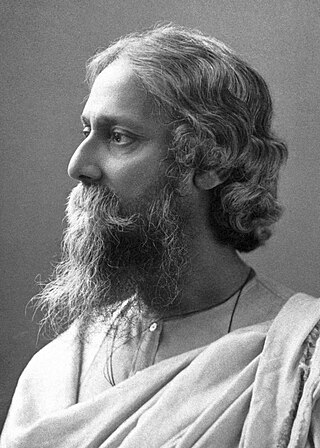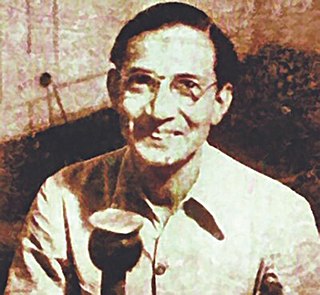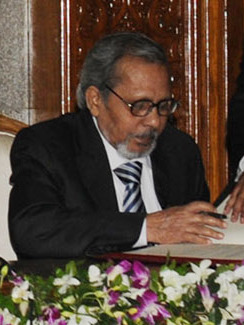Related Research Articles

Bengali poetry is a rich tradition of poetry in the Bengali language and has many different forms. Originating in the Bengal region of South Asia, the history of Bengali poetry underwent three successive stages of development: poetry of the early age, the Medieval period and the age of modern poetry. All ages have seen different forms of poetry and poetical tradition. It reached the pinnacle during the Bengali Renaissance period although it has a rich tradition and has grown independent of the movement. Major Bengali Poets throughout the ages are Chandidas, Alaol, Ramprasad Sen, Michael Madhusudan Dutt, Nabinchandra Sen, Rabindranath Tagore, Dwijendralal Ray, Satyendranath Dutta, Kazi Nazrul Islam, Jibanananda Das, Jasimuddin, Sukanta Battacharya, Al Mahmud.

Kazi Nazrul Islam, also known as the Rebel Poet, was a popular Bengali poet, writer and lyrist born in Churulia district of Bengal Presidency who moved to Bangladesh and took Bangladeshi citizenship after the independence of Bangladesh He was a poet, writer, musician, and is the national poet of Bangladesh. Nazrul produced a large body of poetry, music, messages, novels, and stories with themes that included equality, justice, anti-imperialism, humanity, rebellion against oppression and religious devotion. Nazrul Islam's activism for political and social justice as well as writing a poem titled as "Bidrohī", meaning "the rebel" in Bengali, earned him the title of "Bidrohī Kôbi". His compositions form the avant-garde music genre of Nazrul Gīti.

Jatiya Kabi Kazi Nazrul Islam University is a government-financed public university of Bangladesh. It is also known as JKKNIU or Nazrul University. It is located at Namapara-Battala, Trishal which is a suburb of Mymensingh, some 22 kilometres from Mymensingh urban center.The university was established in 2006. At present more than eight thousand students are studying in the university.

Firoza Begum was a Bangladeshi Nazrul Geeti singer. She was awarded the Independence Day Award in 1979 by the Government of Bangladesh.

Chashi Nazrul Islam was a Bangladeshi film director and producer. He won Bangladesh National Film Award for Best Director twice for the films Shuvoda in 1986 and Hangor Nodi Grenade in 1997. He was awarded Ekushey Padak in 2004 by the Government of Bangladesh.

Kazi Nazrul University (KNU) is a public state research university located in Asansol, West Bengal. The CM Mamata Banerjee laid the foundation stone on 10 January 2013. The university has been named after the poet Kazi Nazrul Islam. The university was established under the Kazi Nazrul University Act, 2012. Anuradha Mukherjee was appointed as the first vice-chancellor of the university. In 2018 in a special convocation the university honored Prime Minister of Bangladesh Sheikh Hasina with honorary Doctorate of Literature.

Notuner Gaan, more popularly known as Chol Chol Chol, is the national march of Bangladesh, whose lyrics and tune were written by national poet Kazi Nazrul Islam in 1928. It was first published in the newspaper Shikha with the title Notuner Gaan and was later included in Nazrul's book Shondha. The Bangladeshi government adopted this song as the national marching song of Bangladesh on 13 January 1972 in its first meeting after the country's independence. The first lines of the song are played at most military ceremonies or functions. The Daily Star has referred to it as the national military song.
Badrunnesa Dalia is a Bangladeshi mainstream Nazrul Geeti and Rabindra Sangeet singer, performer and a music teacher. She is noted for her versatility as a multi-genre artist (singer).
Mustafa Zaman Abbasi is a Bangladeshi musicologist. He was awarded Ekushey Padak in 1995 by the Government of Bangladesh. Abbasi is the youngest son of folk singer-composer Abbas Uddin Ahmed. As of 2016, he serves as a senior research scholar at the "Kazi Nazrul Islam and Abbasuddin Research and Study Centre" of Independent University, Bangladesh.

Abbasuddin Ahmed was a Bengali folk song composer and singer born in the Bengal province of British India. He was known for Bhawaiya folk song which is a style commonly found in Rangpur, Undivided Goalpara district and Cooch Behar
Nashid Kamal is a Bangladeshi vocalist, writer and professor of demography. She is the eldest granddaughter of Bengali folk singer Abbasuddin Ahmed. Kamal is widely regarded as a Nazrul exponent. For her contributions to Nazrul's works, she has received awards including the Nazrul Award from the Nazrul Academy in 2009 and Nazrul Padak from the Nazrul Institute in 2014.

The Nazrul Institute is Bangladesh's national institute, established in February 1985. Its headquarters are located in Kabi Bhaban in Dhanmondi, Dhaka, Bangladesh. It fulfills a number of roles; promoting the literary work of the poet Kazi Nazrul Islam, recognising excellence in literature research by conferring awards, and public engagement.
Khilkhil Kazi is a Bangladeshi singer and organizer. She is the eldest daughter of elocutionist Kazi Sabyasachi and granddaughter of Bangladesh National Poet Kazi Nazrul Islam. She was awarded Nazrul Award 2013 by the Nazrul Institute.

Pralayollas, also known after its first line as Tora sab jayadbhani kar, is a popular revolutionary Bengali song set to Dadra Tala, whose lyrics and tune were written by national poet Kazi Nazrul Islam in 1921. It was the first revolutionary Bengali poem collected in early 1922 in a volume titled Agnibeena: the first anthology of Nazrul's poems.
Nazrul Academy is an academic research institution devoted to the study of the national poet of Bangladesh, Kazi Nazrul Islam, and his works including Nazrul Geeti. The academy is located in Moghbazar, Dhaka, Bangladesh.

Kazi Abu Zafar Mohammed Hasan Siddiqui was a recital artist and cultural activist of Bangladesh. He was the director general of Bangladesh Television. According to Kazi Nazrul Islam's eldest son, the first winner of the Kazi Sabyasachi Award was the personification of Cultural Personality, launched by the Ministry of Culture of the Government of Bangladesh.
Pradip Ghosh was a Bengali elocutionist. His father, elocutionist Chinmoy Jeeban Ghosh, introduced him to the art of recitation at the age of three. Ghosh was a pioneer, who made recitation widely accepted within the cultural milieu of Bengal during the 1960s.

Gouri Ghosh was a noted elocutionist of West Bengal. She had rendered her voice to several milestone albums in Bengali recitation. Known for her work on Tagore poems, like ‘Karna Kunti Sangbad’, ‘Shesher Kabita’ and ‘Bisarjan’. Ghosh started off in the All India Radio as a selection-grade announcer and enthralled the audience for decades. Critically acclaimed for her pronunciation and voice, Ghosh's death marks the end of an era in Bengali recitation.

Mausoleum of Kazi Nazrul Islam is a mausoleum in Dhaka, Bangladesh. It marks the grave of the 20th century writer, poet and musician Kazi Nazrul Islam, Bangladesh’s national poet. He died 29 August 1976.

Biography of Nazrul is a 2020 full-length documentary film directed by Ferdous Khan. The film, produced by Al Amin Khan, is based on the illustrious life and work of Kazi Nazrul Islam, National Poet of Bangladesh, under the initiative of Dhaka-based Nazrul Center which was advised by Ikram Ahmed. The scenes of the film have been shot in the places where the memories of Kazi Nazrul Islam are scattered from his birth to his death. In the film, the biography of Kazi Nazrul Islam is narrated in the background voice of Asaduzzaman Noor and Progya Laboni. The documentary was commercially released in theaters on 20 November 2020.
References
- ↑ Sen, Saibal (6 January 2012). "Political mud-slinging upsets Kazi Nazrul's family". Times of India. Retrieved 27 August 2016.
- 1 2 3 Alom, Zahangir (4 March 2016). "Soumitra and Kazi Arif receive Kazi Sabyasachi Award". The Daily Star. Retrieved 27 August 2016.
- ↑ Subodhchandra Senguta & Anjali Bose (2016). Sansad Bengali Charitabhidhan Vol.I. Sahitya Sansad,Kolkata. p. 766. ISBN 978-81-7955-135-6.
- 1 2 3 4 "Award in elocution, in honour of Kazi Sabyasachi". The Daily Star. 26 May 2012. Retrieved 27 August 2016.
- ↑ Mahmud, Jamil (25 May 2009). "The many facets of Nazrul". The Daily Star. Retrieved 27 August 2016.
- ↑ "Sabyasachi Award..." The Daily Star. 26 May 2012. Retrieved 27 August 2016.